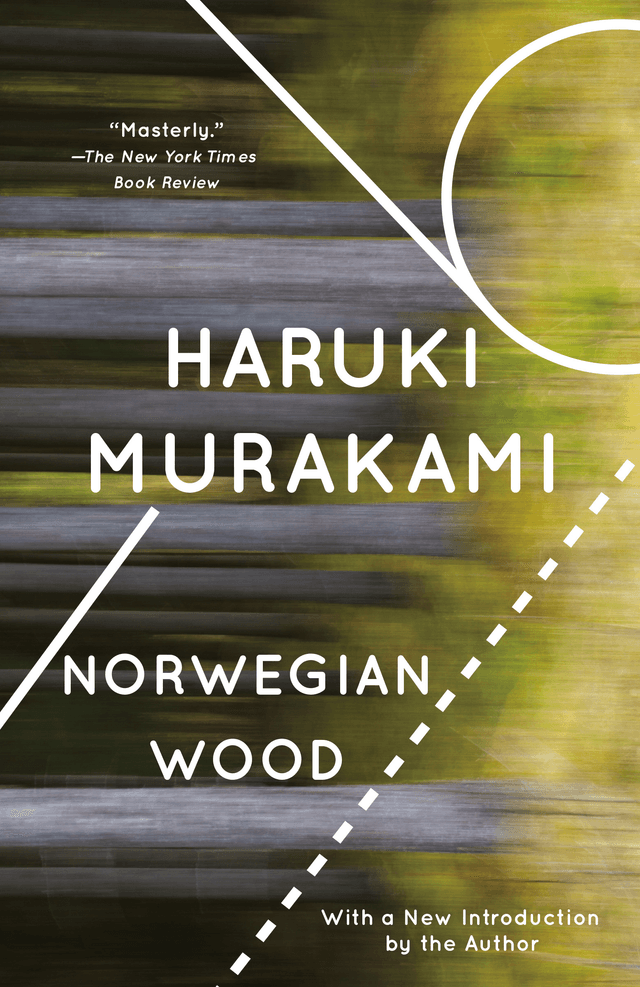What I Talk About When I Talk About Running vs. Norwegian Wood
What I Talk About When I Talk About Running
What I Talk About When I Talk About Running is a memoir by Haruki Murakami where he talks about two things that define a big part of his life: running and writing. Murakami didn’t always plan on being a novelist. He was running a jazz bar in his twenties when, while watching a baseball game, he suddenly thought, “I could write a novel.” He gave it a shot, it worked out, and he eventually sold his bar to focus on writing full-time. But sitting at a desk all day, smoking and not moving much, wasn’t doing his health any good. That’s when he picked up running. For Murakami, running is more than just exercise—it’s part of his routine and, in a way, a metaphor for writing. Both take endurance. Both are long hauls where you push yourself day after day, even when you don’t feel like it. The book follows him as he trains for marathons, competes in triathlons, and grapples with the slow decline of his physical abilities as he ages. He talks a lot about acceptance—accepting getting older, accept...
Norwegian Wood
Toru, a serious young college student in Tokyo, is devoted to Naoko, a beautiful and introspective young woman, but their mutual passion is marked by the tragic death of their best friend years before. As Naoko retreats further into her own world, Toru finds himself drawn to a fiercely independent and sexually liberated young woman. Stunning and elegiac, Norwegian Wood first propelled Haruki Murakami into the forefront of the literary scene.

Reviews
Reviewed on 2/28/2024
I read this book when I first started running long distance. I was living in Chiang Mai and I'd go this huge park a couple of times a week and just run loops around the lake. At the end of my run I'd grab a milk tea and a banana bread from a local coffee shop and just read a few pages. Great memories of many chill evenings, running and reading about running.
Reviews
| Item | Votes | Upvote |
|---|---|---|
| Easy read | 1 | |
| Motivating | 1 | |
| Peaceful | 1 |
| Item | Votes | Upvote |
|---|---|---|
| No cons yet, would you like to add one? | ||
| Item | Votes | Upvote |
|---|---|---|
| No pros yet, would you like to add one? | ||
| Item | Votes | Upvote |
|---|---|---|
| No cons yet, would you like to add one? | ||
Frequently Asked Questions
'What I Talk About When I Talk About Running' is focused on personal growth through the lens of running and writing, offering motivational insights and a peaceful narrative. It appeals to readers looking for inspiration and reflections on perseverance. In contrast, 'Norwegian Wood' delves into complex emotional themes and relationships, making it more suitable for readers interested in deep character studies and the intricacies of love and loss. The choice depends on whether the reader prefers a motivational journey or an emotional exploration.
'What I Talk About When I Talk About Running' presents a diary-like narrative that is easy to read and motivating, making it engaging for those who enjoy personal anecdotes and reflections. On the other hand, 'Norwegian Wood' features a more traditional narrative style that is stunning and elegiac, appealing to readers who appreciate literary depth and emotional resonance. The preference for narrative style will depend on the reader's taste for either a motivational memoir or a poignant novel.
'What I Talk About When I Talk About Running' is generally more suitable for casual readers due to its easy readability and motivational themes, making it accessible to a wider audience. In contrast, 'Norwegian Wood' may require a deeper engagement with its complex themes and character dynamics, which might appeal more to readers looking for a profound literary experience. Therefore, casual readers may find 'What I Talk About When I Talk About Running' to be a better fit.
'What I Talk About When I Talk About Running' is a memoir by Haruki Murakami that explores the intertwined themes of running and writing. Murakami shares his journey from running a jazz bar to becoming a novelist, detailing how running became a crucial part of his life and a metaphor for his writing process. The book reflects on endurance, acceptance of aging, and the highs and lows of both running and writing.
Pros of 'What I Talk About When I Talk About Running' include its easy readability, motivating content, and the peaceful tone of Murakami's writing. There are no cons listed for this book, indicating that readers generally find it to be a positive experience.
Haruki Murakami is a renowned Japanese author known for his unique blend of magical realism, surrealism, and themes of loneliness and existentialism. He gained international fame with novels such as 'Norwegian Wood' and 'Kafka on the Shore.' In 'What I Talk About When I Talk About Running,' he shares personal insights into his life as a writer and runner.
The writing style of 'What I Talk About When I Talk About Running' is straightforward and conversational, as if Murakami is sharing his thoughts over coffee. He often includes personal anecdotes and reflections, making the narrative relatable and engaging for readers.
In 'What I Talk About When I Talk About Running,' memorable moments include Murakami's experiences training for marathons, his reflections on aging and acceptance, and the simple joys of running, such as the satisfaction of finishing a race and enjoying a cold beer afterward. His vivid descriptions of running the original marathon route in Greece also stand out.
'Norwegian Wood' is a novel by Haruki Murakami that follows the story of Toru, a serious college student in Tokyo. The plot revolves around Toru's devotion to Naoko, a beautiful and introspective young woman. Their relationship is deeply affected by the tragic death of their best friend years before. As Naoko withdraws further into her own world, Toru becomes attracted to another woman who is fiercely independent and sexually liberated. The novel is known for its elegiac and stunning prose, and it played a significant role in propelling Murakami into the literary spotlight.
Haruki Murakami is a renowned Japanese author known for his unique blend of fantasy, realism, and surrealism. His works often explore themes of loneliness, existentialism, and the human psyche. Some of his most famous books include 'Norwegian Wood', 'Kafka on the Shore', and '1Q84'. Murakami's writing has garnered a global audience and has been translated into numerous languages.
'Norwegian Wood' delves into themes such as love, loss, and mental health. The novel explores the complexities of human relationships and the impact of past traumas on the present. It also touches on the struggles of dealing with grief and finding one's own identity amidst emotional turmoil.
'Norwegian Wood' is significant in Haruki Murakami's career as it was the book that brought him widespread recognition and propelled him into the forefront of the literary scene. The novel's emotive and introspective narrative resonated with a large audience, establishing Murakami as a leading voice in contemporary literature.
'Norwegian Wood' contains mature themes, including mental illness, suicide, and sexual content. While it is a beautifully written novel, it may not be suitable for all readers, particularly younger audiences or those sensitive to such topics. Readers should consider these elements before deciding to read the book.




















